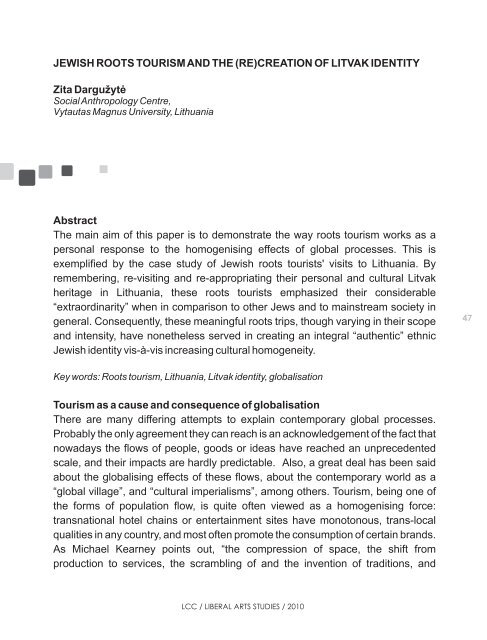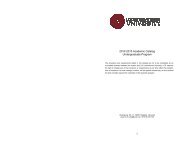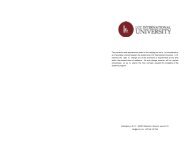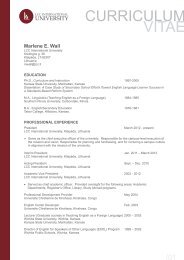lcc liberal arts studies / 2010 volume iii - LCC International University
lcc liberal arts studies / 2010 volume iii - LCC International University
lcc liberal arts studies / 2010 volume iii - LCC International University
Create successful ePaper yourself
Turn your PDF publications into a flip-book with our unique Google optimized e-Paper software.
JEWISH ROOTS TOURISM AND THE (RE)CREATION OF LITVAK IDENTITY<br />
Zita Darguþytë<br />
Social Anthropology Centre,<br />
Vytautas Magnus <strong>University</strong>, Lithuania<br />
Abstract<br />
The main aim of this paper is to demonstrate the way roots tourism works as a<br />
personal response to the homogenising effects of global processes. This is<br />
exemplified by the case study of Jewish roots tourists' visits to Lithuania. By<br />
remembering, re-visiting and re-appropriating their personal and cultural Litvak<br />
heritage in Lithuania, these roots tourists emphasized their considerable<br />
“extraordinarity” when in comparison to other Jews and to mainstream society in<br />
general. Consequently, these meaningful roots trips, though varying in their scope<br />
and intensity, have nonetheless served in creating an integral “authentic” ethnic<br />
Jewish identity vis-à-vis increasing cultural homogeneity.<br />
Key words: Roots tourism, Lithuania, Litvak identity, globalisation<br />
Tourism as a cause and consequence of globalisation<br />
There are many differing attempts to explain contemporary global processes.<br />
Probably the only agreement they can reach is an acknowledgement of the fact that<br />
nowadays the flows of people, goods or ideas have reached an unprecedented<br />
scale, and their impacts are hardly predictable. Also, a great deal has been said<br />
about the globalising effects of these flows, about the contemporary world as a<br />
“global village”, and “cultural imperialisms”, among others. Tourism, being one of<br />
the forms of population flow, is quite often viewed as a homogenising force:<br />
transnational hotel chains or entertainment sites have monotonous, trans-local<br />
qualities in any country, and most often promote the consumption of certain brands.<br />
As Michael Kearney points out, “the compression of space, the shift from<br />
production to services, the scrambling of and the invention of traditions, and<br />
<strong>LCC</strong> / LIBERAL ARTS STUDIES / <strong>2010</strong><br />
47






